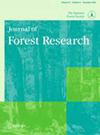Effects of thinning on tree growth and soil physiochemical properties in Cunninghamia lanceolata plantation
IF 1.1
4区 农林科学
Q3 FORESTRY
引用次数: 0
Abstract
ABSTRACT Tree growth, along with soil properties, is greatly affected by forest management. We used a typical sampling to study the impact of four thinning intensities (T1: 0%, 2500 stems ha−1; T2: 20%, 2010 stems ha−1; T3: 30%, 1750 stems ha−1; T4: 40%, 1500 stems ha−1) on the tree growth and soil physicochemical properties and their correlation in Cunninghamia lanceolata plantations. The average annual increments in tree height, diameter at breast height (DBH), and volume increased with thinning intensity, and those of T4 differed significantly (P < 0.05) from those of T1. The average annual stand volume increments of T4 were significantly (P < 0.05) lower than that of T1, while the maximum value presented at T3. However, the effect of thinning in promoting the growth of Chinese fir diminished with time. As the thinning intensity increased, the diameter class distribution of the sample stands moved rightwards. Moreover, thinning improved soil physiochemical properties. The effects of thinning on soil properties in 0–20 cm soil layer were greater than those in 20–40 cm soil layer. There was a positive correlation between available nitrogen, available potassium and tree growth. The results of this study showed that thinning had a potential effect on tree growth and soil properties. The heavy thinning intensity (approximately 1500 stems ha−1) was the optimum for maintaining economic and ecological benefits. However, heavy thinning significantly reduced stand volume. From the perspective of improving stand volume and biomass, a moderate thinning intensity (approximately 1750 stems ha−1) could be considered for adoption.疏伐对杉木人工林树木生长及土壤理化性质的影响
摘要树木的生长和土壤特性在很大程度上受到森林管理的影响。我们采用典型抽样研究了四种疏伐强度(T1:0%,2500茎ha−1;T2:20%,2010茎ha−2 0;T3:30%,1750茎ha−3;T4:40%,1500茎ha−4)对杉木人工林树木生长和土壤理化性质的影响及其相关性。树高、胸径和材积的年均增量随间伐强度的增加而增加,T4的年均增量差异显著(P < 0.05)。T4年平均林分蓄积量增幅显著(P < 0.05),而最大值出现在T3。疏伐对杉木生长的促进作用随时间的推移而减弱。随着间伐强度的增加,林分的直径等级分布向右移动。此外,间伐改善了土壤的理化性质。0–20年疏伐对土壤性质的影响 cm土层大于20-40 cm土层。有效氮、有效钾与树木生长呈正相关。这项研究的结果表明,疏伐对树木生长和土壤性质有潜在影响。重度疏伐强度(约1500茎ha−1)是保持经济和生态效益的最佳条件。然而,大量疏伐显著减少了林分体积。从提高林分体积和生物量的角度来看,可以考虑采用中等的疏伐强度(约1750茎ha−1)。
本文章由计算机程序翻译,如有差异,请以英文原文为准。
求助全文
约1分钟内获得全文
求助全文
来源期刊

Journal of Forest Research
农林科学-林学
CiteScore
3.00
自引率
6.70%
发文量
62
审稿时长
3 months
期刊介绍:
Journal of Forest Research publishes original articles, reviews, and short communications. It covers all aspects of forest research, both basic and applied, with the aim of encouraging international communication between scientists in different fields who share a common interest in forest science.
 求助内容:
求助内容: 应助结果提醒方式:
应助结果提醒方式:


